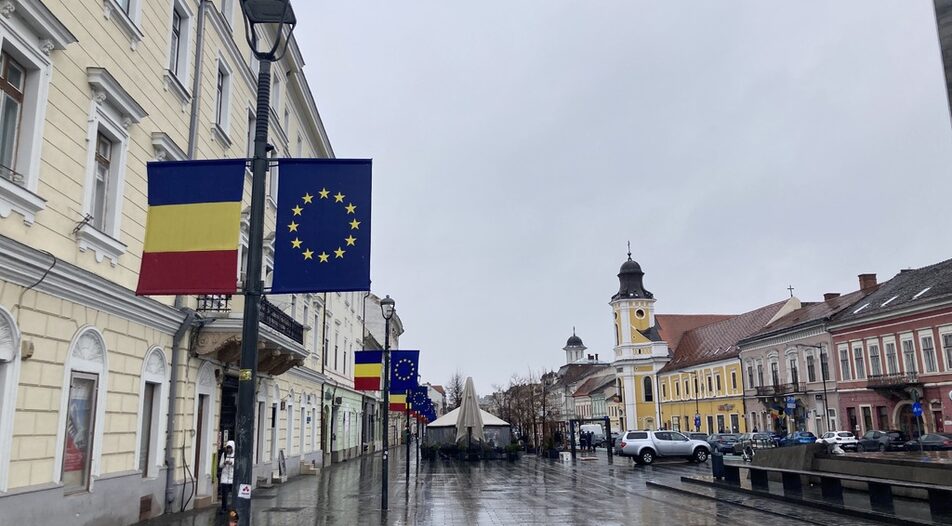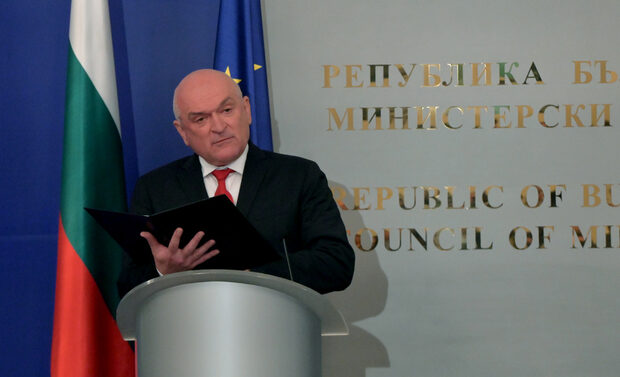Most of you probably know where Cluj is. Yet for those who don't, it's in the heart of Transylvania, one of those charming little Habsburg cities left scattered all over Central Europe as a legacy of an empire long-gone.
It looks like a typical mix of post and pre-communism: a beautiful central part and brutalistic neighborhoods, good public transportation and big traffic jams. On the inside, however, Romania's second biggest city has become a beacon of hope for the future.
Cluj has leapt forward economically over the last couple of decades, due to proximity to Western markets, IT relocation and good governance. It has lured many Romanians from within but also from abroad, proving it can grow in a shrinking country. There are, of course, problems with this: real estate is more expensive than Bucharest with 3000 euro/sq.m in the center, the traffic is bad, and truth be told, given its size and lack of world-class features, it will struggle to attract many western expats (while still not attracting enough non-EU migrants). But more on that some other time, I promise.
Because I want to talk about governance and how it affects us. Let's compare Cluj and Plovdiv: the second-tier cities in neighboring countries. Both have doubled their GDP per capita in the past decade in nominal terms. Yet if you look closely, Cluj is racing ahead, while Plovdiv is crawling behind. While they started roughly at the same place in 2000, by 2022 the difference was huge: Cluj is already above 100% of the EU median, while Plovdiv is at 47%.
Of course, part of this is because the Bulgarian city is home to many factories with low-cost workers while Cluj is in the midst of an IT boom. It will take longer for Plovdiv to grow organically although this might be more stable in the long run.
But part of this is also down to the people in charge of the cities.
Cluj has had one mayor for the past 20 years - Emil Boc. He managed to create a system in which citizens are listened to, public hearings are meaningful, able people run the municipality and good ideas are implemented. To give an example, the municipality paid the transport faculty of the tech university to create the tender book for e-mobility and then run the procurement and choose the winner.
There hasn't been a corruption scandal in Cluj in over 10 years. Boc himself is a modest man and a professor. By contrast: Plovdiv is a mess of inability, corruption, scandals daily and a total lack of vision (let alone consulting the public).
This is not an isolated story. This is a way to run a city, or a country, which is vastly different from what happens here. It wasn't smooth or fast. The huge anti-corruption drive in the past decade resembled something between a civil war and the anti-mafia raids in Italy. Yet as a result of that and of the few men and women who led the charge, Romania was able to speed ahead and cities like Cluj are reaping the benefits.
This is a huge lesson for Plovdiv, Varna, Ruse and the like before the local elections this year. Sometimes, it really does just take a few honest men (or women) to make a difference.
This newsletter is helped by
Martin Dimitrov & Evgeni Ahmadzai& Mary Ivanova
Politics this week:
Parliament: White smoke in the chimney?On Wednesday, after a week-long first plenary sitting, the new parliament finally managed to elect its speaker. The process has been inordinately long because of the deadlock between the first and the second largest factions, GERB and WCC-DB. The Easter break obviously saw a slight thawing in relations between the two factions. This is a significant break with the previous hardline position of the anti-GERB parties and indicates change is afoot.
The two formations agreed that Rosen Zhelyazkov (GERB) will be the chairman of the National Assembly. WCC-DB, on the other hand, will name the chairman of the Justice Committee (they still have no name proposed), and their nomination will rely on GERB's support.
According to the contact groups of the two parties, if this parliament runs for more than three months, there will be a rotation of the two posts between the two factions.
Don't expect a rotational PM (or a return of Borissov)
It's doubtful, however, that these goodwill gestures will have meaningful implications - and lead to a government. The duo leading the negotiations - Nikolay Denkov (WCC-DB) and GERB's Dessislava Atanssova - underlined that the agreement is strictly about legislative motions and would not lead to a governing coalition. Those, they said, are to be led by party leaders.
So, what did they agree on:
The two factions agreed on a set of priority laws in need of passing. These include changes to the anti-corruption commission and those to the Criminal Procedure Code, which introduce an investigative figure that is to serve as an independent investigator of the actions of the Prosecutor General. Most of the bills concern reforms under the Recovery and Sustainability Plan, to help Bulgaria's accession to the euro area and Schengen as well as the path to EU money.
Also: more sea and less violence
They also agreed on other proposals such as the law to protect the seaside from overbuilding and the Law on Protection from Domestic Violence which has become a particularly painful topic in the last month because of several deaths.
Massive change of regulators is in order
The last 2 years produced a backlog of positions to be filled. According to a letter the Bulgarian Institute for Legal Initiatives (BILI) sent to the parliamentary parties, a total of 68 members of 17 key regulators and other institutions are waiting to be changed, including 11 Supreme Judicial Council magistrates with expired mandates and the National Bank governor.
Economy:
And what about the budget?Despite the breakthrough, the two parties do not seem to be ready to go all the way when it comes to the next state budget. Borissov's party believes that the draft bill should only be tabled by the next regular government, while the reformist coalition argues that there is no time to waste and the budget should be prepared by the caretaker cabinet.
GERB's Denitsa Sacheva said that they have agreed on a 3 percent deficit, no tax increase and optimization of public spending, but adding that the topic of who submits the draft budget remains a dividing line.
No cheap grain, thanks, we'd like our prices high
On Wednesday, the caretaker cabinet announced that Bulgaria will impose a temporary ban on imports of more than 20 types of food originating in Ukraine, including wheat, sunflower and corn, but also wheat flour, sunflower oil, honey and bee products, raw milk and dried milk, milk concentrate, walnuts, hazelnuts, eggs, poultry meat, pork, sheep and goat meat. The ban will also apply to rye, barley, oatmeal, sorghum, buckwheat, starches, inulin, wheat gluten, soybeans, flaxseed, rapeseed, wine, wine vinegar and ethyl alcohol.
The temporary ban came after heavy lobbying on behalf of Bulgarian agricultural producers, who are worried about their produce which is (obviously) more expensive. What this means is, of course, the consumer will be paying more, while some of the country's wealthiest people (the grain lobby) will get more money.
The ban will be in force from 24 April to 30 June, but it will not apply to Ukrainian goods in transit through Bulgaria to third countries.
Figures:
27%
of companies intend to expand their workforce, down by 19% from 2022, national survey reports. Hiring plans are the most modest they have been since 2021, pointing to a gradual cooling of the labor market.
14%
Is the annual inflation rate in March which is a slowdown
16.9%
Is the growth of household income in the last year
Business:
ArtWoood
Sofia-based design atelier Woood completed its second order for LVMH - a set of light installations inspired by artist Yaoi Kusama, which people can now see across Louis Vuitton's boutiques in Paris. Apart from making custom orders for clients from Bulgaria and abroad, Woood offers designers and artists a shared makerspace atelier against a monthly membership where they can work on individual projects.
IT
Nemetschek
The company has a Plovdiv office, which should reach 60 people by the end of the year. The IT company experienced 22% growth last year.
ENERGY
Nuclear reactor down againJust before Easter, the nuclear power plant in Kozloduy announced that one of its two reactors will shut down due to a steam generator leak. The emergency is by no means unprecedented; only last year the plant had to close down the same reactor for the same reason. The leak remains unidentified and it is not clear when the plant could return to full operation. Moreover, the other "healthy" reactor has to undergo regular annual maintenance in May, meaning that both reactors could be off and Bulgaria's nuclear output will be zero.
Here comes the carbon tax of death again
The past week also showed a rapid rise in the carbon price (EU ETS) which Bulgarian coal plants have to purchase due to the fossil regulations in the union. Considering that the electricity on the market is 100 euro per mwh, prices in the range of 100 euro per ton for the carbon allowances mean that plants register serious financial losses for every megawatt of produced energy.
WATCH OUT FOR
Person:Georgi Harizanov
The GERB-related ex-administrator, turned media mogul, turned political analyst (and ironically, a libertarian) has parted ways with Euronews Bulgaria, where he was a manager and will find new projects, announced both the media and Harizanov himself.
Ivan Shishkov
The caretaker minister of regional development keeps on touring the country, promising huge new projects and highways, obviously striving for a political position after his current assignment.
Place:
Saudi Arabia
The next destination of low-cost carrier WizzAir from Sofia is Riyadh, operational from this Thursday.
Date
2028
is the earliest possible date for the completion of Plovdiv's S-bahn which is due to connect the region around the city
18 May
Digitalk conference: One of the leading events organized by Economedia and Capital returns soon for its 2023 edition, dedicated to people, innovation and technology breakthroughs that will drive humanity and businesses forward. Save the date and don't forget to sign up!
Company
The next Citylovers
Who will be the next Gradolyubiteli (citylovers)? The competition for good urban governance ideas, organized by Capital weekly and supported by the British Embassy, returns for the third time around, now with another grand sponsor, Bulmarket Group. Check it out and share it with potential contenders.
Word of the week
Времеубежище - Time ShelterThe book by the brilliant Georgi Gospodinov reached the final 6 of the prestigious Booker prize. We have recommended it before, but here's some illuminating advice for you - if you want to understand the inner sadness of Eastern Europe, Gospodinov is your man. I highly recommend his short stories, which you'll find are all building up to the brilliance of Time Shelter.
Most of you probably know where Cluj is. Yet for those who don't, it's in the heart of Transylvania, one of those charming little Habsburg cities left scattered all over Central Europe as a legacy of an empire long-gone.
It looks like a typical mix of post and pre-communism: a beautiful central part and brutalistic neighborhoods, good public transportation and big traffic jams. On the inside, however, Romania's second biggest city has become a beacon of hope for the future.












